| Genetically modified soyabean: a viable option for smallholders in Africa? |
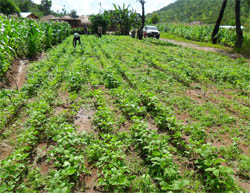 |
In 2011, roughly three quarters of the global soyabean cultivation area was planted with genetically modified (GM) soyabean (James, 2012). In Africa, GM soyabean is only commercially cultivated in South Africa. Is the rest of Africa missing out on a great opportunity, or are the disadvantages of GM soyabean for smallholders outweighing the benefits?
Photo: the weed problem
|
|
1 |
| N2Africa featured in Nature |
N2Africa was featured in a recent article on the problems of soil fertility in Africa. To read the article click here.
|
1 |
| Introduction |
One issue often raised when we discuss soyabean as an important crop for smallholder farmers in Africa, is the use of genetically-modified varieties. A discussion was sparked amongst N2Africa staff, and it came to light that Linus Franke had written a report on the issue of GMOs recently. We summarise some of the recent discussions in this latest edition of the Podcaster. Apart from news items from various countries, we also report on steps taken to expand the activities to N2Africa to new countries. I hope you will find items of interest, and if you feel your country is under-represented in the Podcaster, please send in your articles for the next issue!
|
1 |
| Legume production in Zimbabwe: An update |
|
In the eight districts where N2Africa is working in Zimbabwe, farmers are expanding the area they put under legumes. Farmers are increasingly aware of the importance of legumes for enhancement of soil fertility, but also the nutritious protein provided by legumes and their profitability as compared with other crops that were previously prioritised in the districts.
Mr. Karambwe and his mother receiving a knapsack sprayer on a field day in Guruve
|
 |
|
2 |
| N2Uganda |
We have started exploring opportunities to initiate N2Africa activities in Uganda. To this end I met with several potential partners in Kampala and also travelled to the area around Kabale in the south-west Uganda and to Mbale in the south-east of Uganda. Piet van Asten of IITA was kind enough to arrange and host a round table discussion that was attended by representatives of various departments of Makerere University, National Agriculture Research Organisation (NARO), World Vision, the CIAT Bean Program/ PABRA, Uganda National Agro-input Dealers Association (UNADA) and IFDC. We made good progress in identifying priority crops and regions where N2Africa is likely to focus and will be following up in the coming months with planning activities. Thanks to all who participated and we look forward to starting up with new partners in the coming year.
|
2 |
| Forage legumes in Zimbabwe – a brief summary |
|
Forage legumes are an affordable alternative feed for dairy livestock for the cash constrained smallholder farmers in Zimbabwe. Local pastures are usually inadequate for livestock especially during the dry season. The grazing quality of the native pastures also depends on the species composition of most pastures where most farmers graze their cattle. Sporobolus pyramidalis is a dominant species in Zimbabwe‘s pastures and has been classified as the worst in terms of feed quality for livestock. There is need therefore to supplement; protein rich concentrates are often unavailable and unaffordable for most smallholder farmers leaving protein rich forage legumes as the next viable option. ...
|
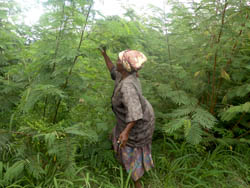 |
|
3 |
| Will the dry bones live again? Insights from the N2Africa/IFAD field day in Mudzi district, Zimbabwe. |
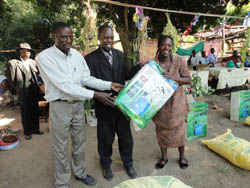 |
When the N2Africa project was launched in Mudzi district in the 2010/11 season, most farmers and local authorities were very skeptical of the concept of biological nitrogen fixation. Farmers who have stayed in the district for over 20 years argued that growing soyabeans, common beans, groundnuts and cowpeas intensively in the area would not be successful since Mudzi lies in natural farming region IV which has low agro-ecological potential largely due to scarce and erratic rainfall.
|
|
3 |
| George Mkhwamba – One of N2Africa’s Leading Farmers in Malawi |
 |
When the Agricultural Extension Officer from the Department of Agricultural Extension Services (DAES) in Salima resigned last year, Mr. George Mkhwamba began to coordinate all the N2Africa activities with his fellow Lead Farmers in the area. He did this at his own initiative and voluntarily. He leads Tipindule, a club of 24 farmers growing soyabean and on top of that he is visiting all the other Lead Farmers and their groups to ensure that everyone understands and uses the N2Africa technologies in their legume cultivation. ...
|
|
4 |
| See to my strain |
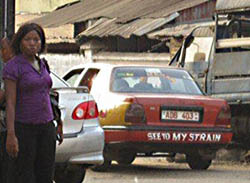 |
Although in local Sierra Leonean Pidgin "see to my strain" does not have anything to do with rhizobia and inoculation, this text on the back of a car in Freetown nicely covered the purpose of our trip to Sierra Leone and Liberia, where N2Africa is currently expanding with additional funding from the H.G. Buffet foundation.
During the first exploratory trip from March 18-23 we considered both the rhizobial and other legume-associated issues of see to my strain and what it actually means in Pidgin: see to my problems.
|
|
5 |
| IITA extends N2Africa to Sierra Leone |
|
With a grant of the H.G. Buffet foundation, N2Africa is currently expanding its activities into Liberia, Sierra Leone and north-Kivu in DRC. To kick-start activities in the new West-African countries, at the end of March meetings were held in both Sierra Leone and Liberia. The meeting in Sierra Leone even attracted a journalist, Richard Bockarie, who published the following piece in The UPDATE Newspaper of 22-03-2012.
|
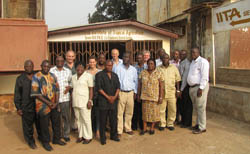 |
|
5 |
| Progress N2Africa in Ethiopia |
|
Esther Ronner reports about the start up meetings and what to do next to get prepared for the real work for N2Africa in Ethiopia.
|
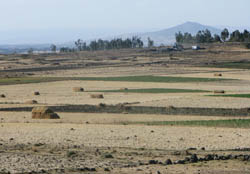 |
|
6 |









